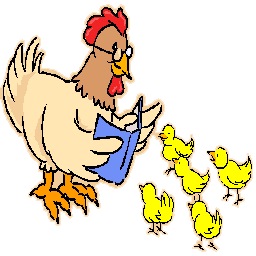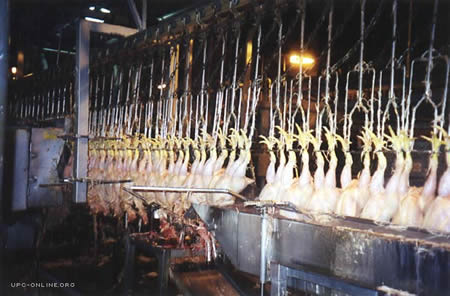|
We in modern society are great when it comes to being outraged by the mistreatment of pets, whether they be dogs, cats, horses, or even hamsters. We're less inclined to apply such standards of decency to farm animals—the critters that eventually become part of our lunches or dinners. This is partly because of the "I don't want to think about it" factor— how the food gets to our plates is not something most people want a lot of detail about. But we cannot claim to be a civilized, compassionate society without addressing such issues.
So, today, we offer a guest article about the chicken—the source of what would seem to be a never-ending stream of entree centerpieces for restaurant meals and frozen TV dinners. The article is from the
People for the Ethical Treatment of Animals
(PETA), the world's largest animal rights organization. You may find some of the details in the piece disturbing, but we hope you will find the courage to not only finish the article but to assess how your own eating habits play into the issue.
Finally, we would like to state for the record that we think all animals deserve respectful treatment. Except one. Death to the Chia-Pet!
~ ~ ~
Give a Cluck About Chickens
by Heather Moore, People for the Ethical Treatment of Animals (PETA)
The Nature of the Chicken
Most people don't know chickens as well as they know dogs and cats, but these gentle birds can feel happiness, loneliness, fear, and pain, just the same as our furry friends.
In their natural surroundings, chickens spend their day foraging for food, making nests, roosting in trees, flapping their wings, and taking sun and dust baths. They exist in stable social groups and can recognize each other by their facial features. Like us, chickens form strong family ties and mourn when they
 lose a loved one. A mother hen will turn her eggs as many as five times an hour and cluck to her unborn chicks, who will chirp back to her and to one another.
lose a loved one. A mother hen will turn her eggs as many as five times an hour and cluck to her unborn chicks, who will chirp back to her and to one another.
Chickens are no birdbrains. They have at least 24 distinct cries to communicate, including separate alarm calls to indicate whether a predator is traveling by land or by sea. According to Chris Evans, who studies animal behavior and communication at Macquarie University in Australia, chickens have cognitive abilities "beyond the capacity of small children." The PBS documentary The Natural History of the Chicken revealed that chickens like to watch television and have vision similar to humans. A study by the Biophysics Group at Silsoe Research Institute in England found that chickens can anticipate the future and demonstrate self-control.
Chicken Raising — A Brutal Business
Nine billion chickens are slaughtered for food every year in the United States alone. Because chickens, turkeys, and other birds are not protected under the Humane Methods of Slaughter Act (the only US law that offers any sort of protection to farmed animals), abuse runs rampant in poultry operations.
Before they are slaughtered and make their way into the food chain, chickens are crammed by the tens of thousands into filthy sheds, where they have to deal with conditions that include:
- extremely limited room to move—each bird lives in an amount of space equivalent to a standard sheet of paper;
- strong ammonia fumes (from accumulated chicken waste);
- no access to fresh air or sunlight.
The impact on the health of the chickens can include respiratory diseases, bacterial infections, crippled legs, heart attacks, and other serious ailments.
Because the unnaturally crowded conditions cause chickens to peck at each other, growers cut off the chicken's sensitive beaks with hot blades. The chickens also routinely suffer broken bones:
- from being bred to be top heavy (i.e. "extra-meaty");
- from callous handling when workers roughly grab birds by their legs and stuff them into crates, and
- from being shackled upside down at slaughterhouses.
Conditions in chicken slaughterhouses cause unnecessary suffering. Investigators from PETA and other animal-welfare organizations, working undercover at slaughterhouses run by major US chicken suppliers, have gathered information and video footage of the very harsh, often inhumane conditions on the killing line. You can get detail on the unpalatable findings regarding chicken processing at the following web sites:

Stopping Cruelty in the Chicken Raising Business
Chickens cannot be raised and slaughtered in a way that is completely without suffering—the sheer number of animals required to feed society's current meat habit makes individual attention to the animals' needs impossible. Unfortunately, animals on "free-range farms" may fare no better than those on factory farms. The animal welfare requirements associated with descriptors like "free range," "cage free," "free roaming," and even "organic" are poorly regulated and hard to substantiate. These labels often do little more than lull consumers into a false sense of security that the food they buy was humanely produced.
PETA believes that the real solution to this problem is for people to go vegetarian, but nevertheless supports any action that will help reduce animal suffering. Better methods of animal farming are possible. Growers can improve animal welfare by:
- Adopting the “Animal Care Standards” program, which covers issues such as ammonia concentration, lighting conditions, and living space in chicken sheds. It also prohibits intentional starvation—i.e. forced molting, in which hens are starved for 5-14 days to temporarily enhance their egg-laying productivity.
- Using mechanized chicken catching, which causes less bruising and fewer broken bones.
- Breeding leaner, healthier, less aggressive birds instead of breeding the biggest, fattest birds possible.
- Halting the practice of routinely feeding chickens antibiotics and other drugs for nontherapeutic purposes.
- Implementing a kinder method of chicken slaughter called controlled-atmosphere killing (CAK). This method puts chickens to sleep by removing the oxygen from their environment and replacing it with an inert gas, like nitrogen or argon. McDonald's has already implemented CAK for chickens in some of its European slaughterhouse suppliers and is looking to use the technology in the US as well.
- Making welfare standards transparent and verifiable. A meaningful animal welfare program must be verified using announced and unannounced independent third-party audits, the results of which must be made available to the public.
|
Corporate unwillingness to treat animals better is not only unethical, it's bad business. Farmed-animal welfare is becoming an increasingly integral part of the agriculture polices of most developed nations. The European Union is already requiring its members to implement newer, kinder standards, and the US industry is changing rapidly. McDonald's, Burger King, and Wendy's have all taken steps to improve the treatment of animals used for their restaurants (albeit after pressure from PETA and concerned individuals).
A positive step you can take as a consumer is to stop patronizing companies that routinely allow cruelty to animals in their supply chain. Please see the sidebar above for information about PETA's KFC campaign. Thanks!
|
|
Kentucky Fried Cruelty |
|
Every year, KFC raises 850 million chickens for its restaurants. As the leader in the chicken industry, KFC has the responsibility to ensure that the chickens raised for its buckets are protected from at least the worst types of cruelty. Insistence by KFC on more humane standards would mean that major chicken suppliers, such as Tyson Foods, Pilgrim's Pride, and Perdue Farms, would also be forced to set better animal welfare standards. Unfortunately, KFC refuses to adopt the Animal Care Standards (see main article), even though all of these standards are supported by KFC's own animal welfare advisors.
Learn how you can help keep up the pressure on KFC on this issue by visiting KentuckyFriedCruelty.com.
|
|
| |
|
|
People for the Ethical Treatment of Animals (PETA), with more than 850,000 members and supporters, is the largest animal rights organization in the world. PETA is dedicated to establishing and protecting the rights of all animals and operates under the simple principle that animals are not ours to eat, wear, experiment on, or use for entertainment. Visit PETA at www.peta.org. |
|
| |
~ ~ ~
The Animal Care Standards outlined above certainly don't seem like too much to ask of the industry. As for vegetarianism, it is a commendable way to eat since by eliminating meat you get 100% assurance that you have completely eliminated your contribution to farm-animal cruelty. You also reduce the overall environmental impact of your food being grown—meat is more high-impact than, say, soybeans or nuts.
|
Still, we must be honest and tell you that we here at Grinning Planet do not practice vegetarianism, though we limit our meat consumption to a few meals a week, and even then we try hard to make sure that the meat came from well treated animals. How does one ensure that? There is really only one way—go visit the farm! Many small farms these days have tours. It's a good thing to know where your food comes from.
|
|
Is there someone you would like to read this article about chicken raising? Please forward it to them.
Books:
Get Grinning Planet free via email
|


